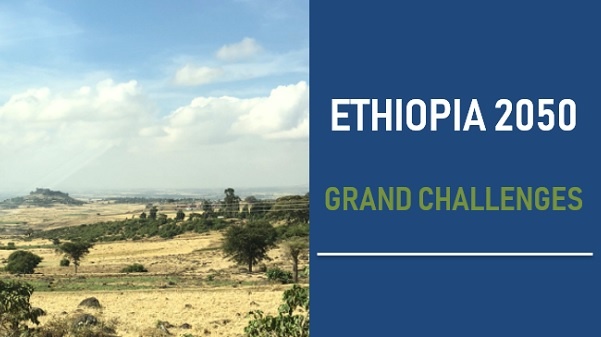
EVENT: ETHIOPIA 2050: Grand Challenges and Opportunities
DATE: December 19–20, 2019
VENUE: Ethiopian Skylight Hotel, Addis Ababa, Ethiopia
Background
Over the last decade, Ethiopia has been recognized as one of the fastest growing economy in Africa by international financing institutions such as the World Bank and the International Monetary Fund (IMF). However, with the country’s population projected to reach almost 200 million by 2050, the scale of challenges that await the country in terms of providing basic and critical infrastructures in energy, water, food, housing, transportation, renewable resources, etc., are staggering. Unless proactive efforts in predicting these massive needs are carried out early and thoughtful plans to address these are prepared accordingly, it will be hard not only to eliminate poverty but also to avoid the threat of the accompanying highly destabilizing societal and environmental problems. Developing countries like Ethiopia are also exposed to other challenges of global dimension that are expected to have disproportionate adverse impact on these countries. This includes the adverse impact of climate change and the threat from the emerging disruptive technologies that are driving the transition to the Fourth Industrial Revolution (Industry 4.0).
On the other hand, however, as a country that is at the early stage of developing its infrastructure for economic development, Ethiopia has huge opportunities to enter a more efficient and sustainable development trajectory through appropriate policy choice and planning processes. This would require making the best and smart use of available knowledge, technology and techniques including smart utilization of the benefits from disruptive technologies. This has provided the basis for the organization of the international conference on ‘Ethiopia 2050: Grand Challenges and Opportunities’. The conference is organized by Ethiopian Engineers in Diaspora in association with Ethiopian Academy of Sciences, Ethiopian Association of Civil Engineers, Association of Ethiopian Architects, Ethiopian Society of Mechanical Engineers, Ethiopian Society of Chemical Engineers, Ethiopian Society of Electrical Engineers, and Ethiopian Urban Planners Association. The conference is expected to lead to a comprehensive report that highlights the key challenges and opportunities together with recommendations for decision-makers at all levels.
Objective
The objective of Ethiopia 2050 conference is to identify the key challenges and opportunities as a starting point for national conversation amongst policy-makers, political and economic leaders, professionals and various stake-holder and provide key pointers towards formulation of concrete and actionable sets of policies that could turn these challenges into opportunities.
Expected outcome
Ethiopia 2050 is expected to result in a comprehensive consensus document that outlines the key challenges and opportunities together with the major action points that could serve as a basis for all major decisions to be made by policy makers, planners, private sector operators, and other stakeholders. The effectiveness of the conference will be measured through its impact in (a) influencing policy making in the years to come and (b) encouraging the subsequent launch of entrepreneurial, public, and government activities around the proposed solutions.
Thematic focus
The following are the major indicative thematic areas that will be covered during the conference.
- Enhancing basic services: includes topics such as ensuring food security, access to health care, meeting energy demand, and access to clean and equitable water distribution.
- Foundation infrastructure: includes natural resources management, ICT infrastructure expansion, transport and communication infrastructure and STEM education and skill-set development.
- Economic development drivers: includes inclusive and sustainable industrialization, ICT-based innovation, and sustainable urban transition.
Organization
The overall organization of the conference is coordinated by an international steering committee consisting of representatives of the partner institutions and engineering societies. A Blue Ribbon Panel (BRP) composed of prominent scholars and experts on the respective themes and topics will be responsible for the preparation of the comprehensive report of the Conference.
Call for partners
The International Steering Committee invites all relevant national institutions and development partners to join us in the organization of the conference on Ethiopia 2050.
For more information on the conference, you may visit the conference website at www.ethiopia2050.com or contact Professor Sam Kassegne at kassegne@sdsu.edu.
Source: ethiopia2050.com
